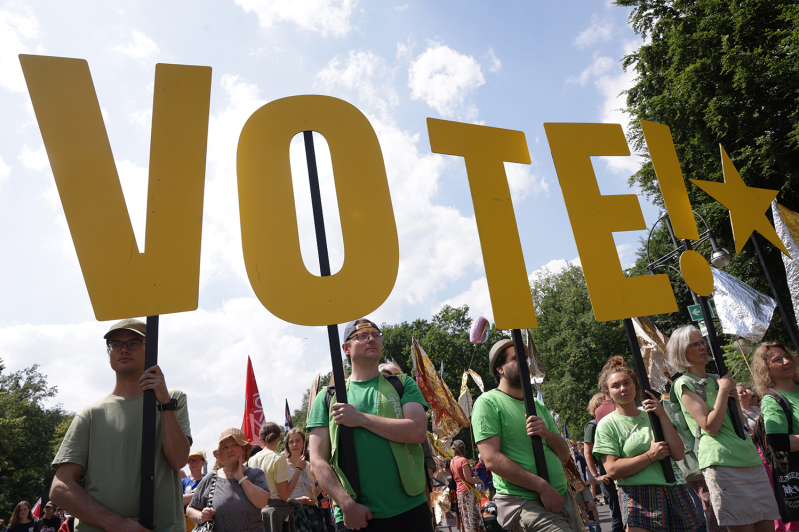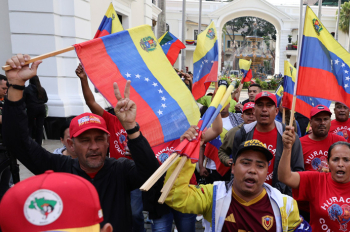
As widely expected, the results of the European Parliament elections held on Sunday, June 9, led to an overall shift towards the right. But it fell short of some of the more extreme predictions that anticipated a significantly stronger win for candidates on the far right, much to the relief of some of the evangelical voices in Europe who had called for prayer and reflection on Europe's values in the lead up to the vote.
More than 400 million citizens of 27 European Union member countries voted for lawmakers that would fill the 720 seats in the EU Parliament.
Among the countries that have seen the most significant shifts to the right is France where President Emmanuel Macron in a surprise move dissolved the parliament and called a two-round snap election for June 30 after his rival Marine Le Pen’s far-right National Rally party achieved 32 percent of votes with French voters, more than double the 15 percent won by Macron’s Renaissance party.
Right wing political groups also made their mark in other countries such as Germany and Italy.
The European Evangelical Alliance (EEA) had published a resources pack before the elections, to help Christians consider how to vote and pray, with issues at stake such as the war in Ukraine, migration issues and financial woes.
“The center did not get the battering many commentators feared,” Arie de Pater, Brussels representative for the EEA said in an exclusive comment for Christian Daily International. “The center, being the Christian Democrats, the Social Democrats, and the Liberals, still form a solid majority in the European Parliament. Right wing parties won some seats, but not as many as some people expected, hoped, or feared.
“Having said that, there are still about 90 members of the European Parliament who don’t belong to a political group or who are non-affiliated. That might change in the next few weeks and change the power balance in the Parliament.”
De Pater referenced the Biblical example of the apostle Paul’s relationship to his mentee Timothy, in advising how evangelicals can pray about the political situation in Europe, now that the European parliamentary results are in.
“When Paul exhorted Timothy to pray for those in authority, his priority was to have a space to live peaceful and quiet lives in all godliness and holiness. The most vulnerable are usually the first victims of major instability in society.
“A drastic shift to the left or the right could have affected our societies more than the current outcome of the European elections. As such, the outcome could be regarded as an outcome to prayer for stability and peace.”
At the same time, De Pater expressed sorrow for would-be “committed and principled” politicians who did not “make it to the new parliament.”
“They’ll be missed. Let’s pray for them and for all those who now bear the responsibility to serve the European Union as a parliamentarian. May God grant them all wisdom they need to build and protect a Union of unity in diversity.
“Meanwhile, I hope that God will grant us, common Christians, the passion and wisdom to serve our neighborhoods and nations in all opportunities and responsibilities we have.”
Jeff Fountain, co-founder of the Schuman Centre for European Studies and frequent commentator on Europe in general and the EU in particular, also expressed relief.
In an interview with Christian Daily ahead of the elections, the former director of Youth With A Mission (YWAM) spoke about the Christian roots of Europe Day, highlighted the Jesus story in Europe's story, and urged Christians to see the big picture in the context of the ongoing Russia-Ukraine war. Following the elections, he renewed his call on followers of Christ to remember history and reflect on who they voted for.
“For those evangelicals who, like myself, believe stronger European partnership and mutual accountability is essential for Europe’s security and flourishing, the election outcome was something of a relief that the center ground held and that the predicted ’sharp right turn’ did not fully eventuate,” said Fountain.
“While the extreme-right grew in some lands, most concerningly in France and Austria, and to a lesser degree in Germany, they did not succeed in Spain and Belgium as they had hoped.
“Some of their success is due to Russian influence in social media, as has been demonstrated in Austria, as Putin’s aim is to undermine European cooperation. Wilders, Orban, Le Pen and friends have stated they aim to hollow out the EU from within, much to Putin’s delight. One consolation is that the radical right is not a unified stream.”
Yet what worries Fountain the most is the predicament of those Christians who may have been fooled into giving support for political parties, whose slogans may have appealed to them but in reality stand in opposition to the ethics of the faith in Jesus.
“Of great concern is that many Christians are taken in by parties claiming to uphold the Judeo-Christian heritage and sometimes support for Israel, yet are anti-democratic, authoritarian, nationalistic, isolationist and sometimes even anti-semitic,” said Fountain.
“The lessons overwhelmingly concluded by leading Christians after World War Two, that forgiveness, reconciliation, mutual accountability and collaboration were essential to 'rebuild Europe on Christian foundations' (as Konrad Adenauer articulated it) seem to have been forgotten by a new generation of believers with little historical awareness of the foundations of the long post-war era of stability that came to a close on February 24, 2022 [when Russia invaded Ukraine].”





